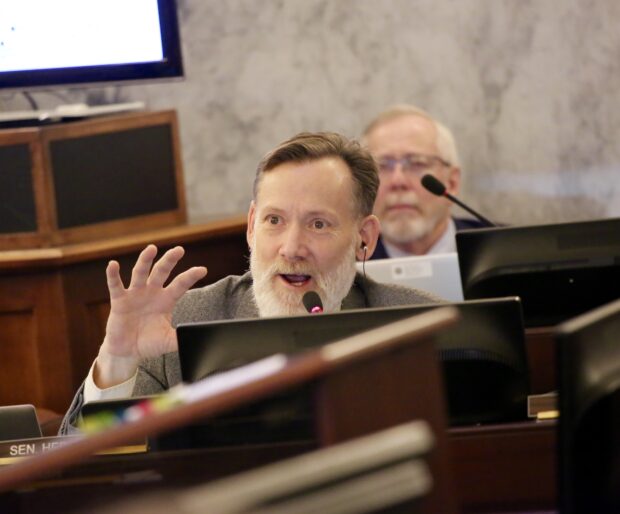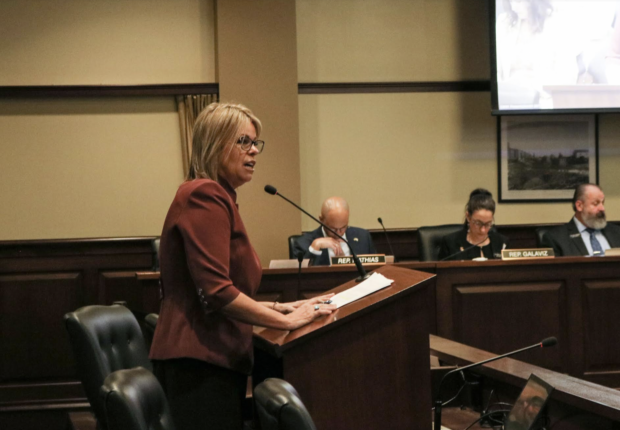With little debate, legislative budget-writers parceled out more than $3.3 billion for public schools Tuesday.
And they said yes to a new round of teacher pay raises, a big cash infusion for classified employee salaries, and additional dollars that schools can use to address local needs.
Add it all up, and it amounts to “the other half of the state budget,” as Joint Finance-Appropriations Committee co-chair Rep. Wendy Horman, R-Idaho Falls, said before the committee all but wrapped up its budget-writing work for 2023.
The K-12 budget bills aren’t a done deal, since they all have to pass the House and the Senate. But JFAC passed all of the bills with strong bipartisan support.
The $3.3 billion includes federal funding, and coronavirus aid packages that Idaho school districts are gradually spending down.
In terms of the state’s general fund — money that comes from sales, income and corporate taxes — the schools stand to receive close to $2.7 billion. That comes to a 16.4% increase, Horman said during Tuesday’s hearing.
The budget bills include a big one-day decision: the $330 million of new, annual K-12 spending approved during September’s legislative session. And they incorporate some of Gov. Brad Little’s top priorities for that money:
- JFAC approved nearly $145 million in new money for teacher pay raises. Little wants to increase starting teacher pay to $47,477 per year. He also wants to add $6,359 per teacher, across the board, into the state’s teacher salary schedule — although salaries are set at the local level.
- JFAC added $97.4 million for salaries for classified employees, such as bus drivers, custodians and classroom paraprofessionals. The state money is designed to replace local dollars schools use to beef up pay for hard-to-fill classified jobs.
- A $48.8 million increase in district “discretionary” funding. This is a slight decrease from Little’s $52.4 million recommendation.
JFAC members haggled over discretionary funding during their hour-long debate on the K-12 budgets.

Sen. Scott Herndon, R-Sagle, sought a $23.8 million increase in discretionary dollars — mirroring a request made in September by then-state superintendent Sherri Ybarra. The $23.8 million was intended to cover inflationary increases, said Herndon, noting forecasts of a possible recession by 2024.
“We need to put some budgetary constraint on the schools,” he said.
Other lawmakers said Herndon’s request would just put more pressure on local property taxpayers.
“Underfunding public education in this state … is a longstanding problem,” said Sen. Dave Lent, R-Idaho Falls, who also chairs the Senate Education Committee.
Herndon’s motion failed on a 5-14 vote. Immediately after that, JFAC approved a bill containing $48.8 million in discretionary dollars, on a bipartisan 15-4 vote.
Minutes after JFAC wrapped up its work on the K-12 budgets, Little issued a news release praising the committee’s work.

“(JFAC) put Idaho students and families first by approving increased pay for teachers and classified staff across the board,” Little said. “We’re making the teaching profession in Idaho more competitive and rewarding, which keeps great teachers in the classroom to help our students achieve.”
Newly elected state superintendent Debbie Critchfield notched a couple of wins in JFAC Tuesday. In January, Critchfield recommended some tweaks in the budget request she inherited from Ybarra.
JFAC restored $10 million for classroom technology, one of Critchfield’s requests. The budget committee didn’t fund Critchfield’s request for $8.2 million to cover rising transportation costs — but, she said, the discretionary funding could help schools pick up the slack.
After Tuesday’s hearing, Critchfield praised JFAC for boosting teacher pay and funding classified salaries, while giving districts the latitude to address their local needs.
“I think it’s a great budget,” she said. “Many of the priority pieces that we’ve heard from school districts are reflected in this budget.”
Idaho Education Association President Layne McInelly touted the proposed pay raises.
“These proposed budgets show all educators — both certified teachers and classified educators — the respect they deserve by providing the competitive, fair compensation Idahoans want them to have,” he said in a news release.
Audio: Click here for state superintendent Debbie Critchfield’s reaction to the budget vote.
